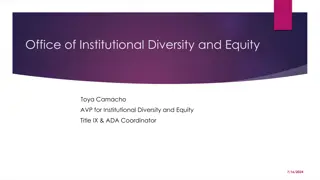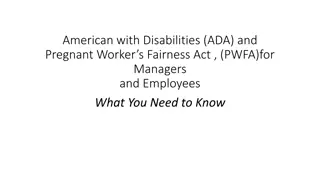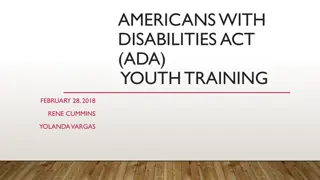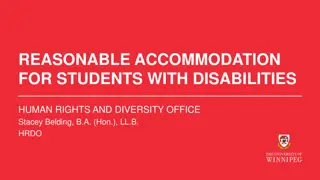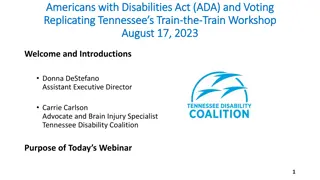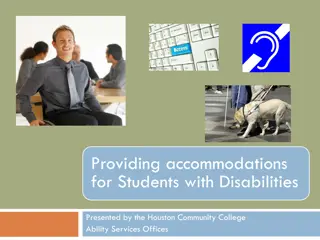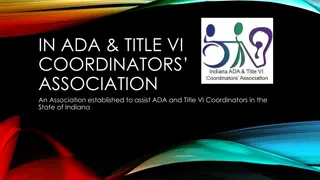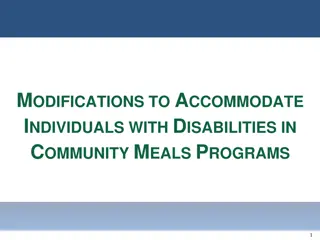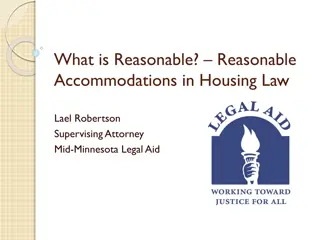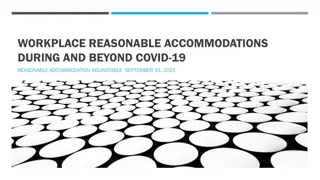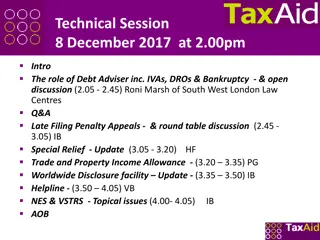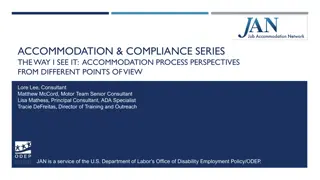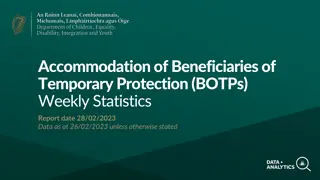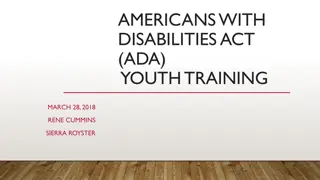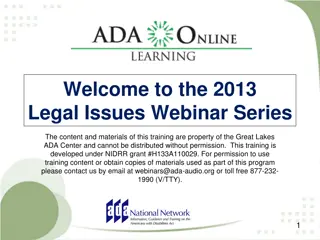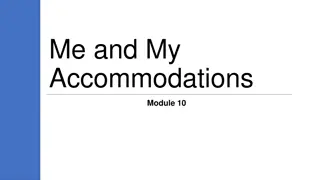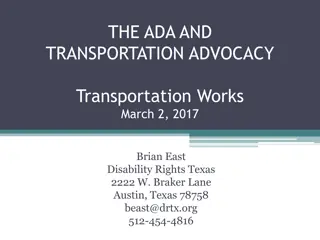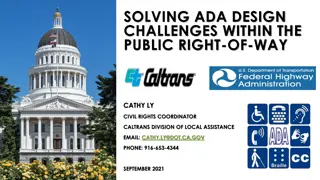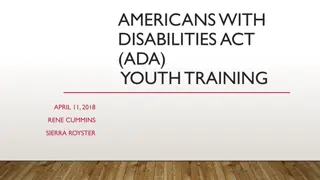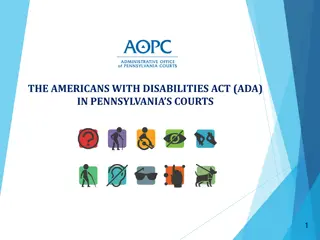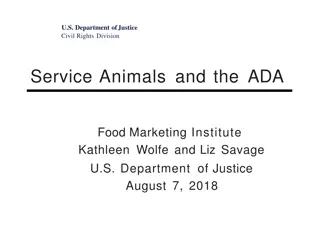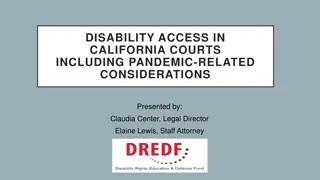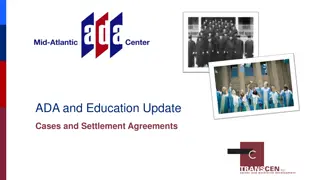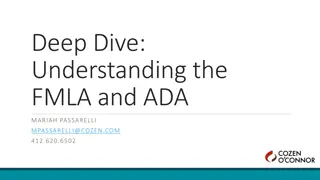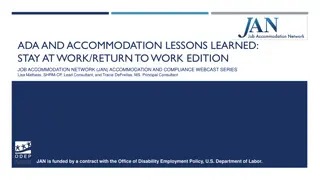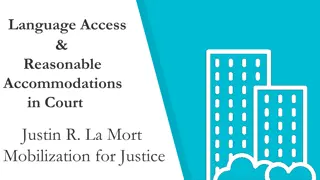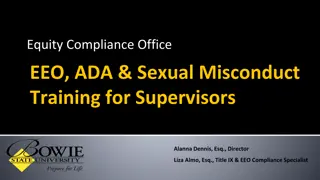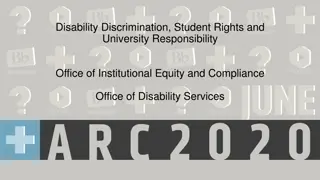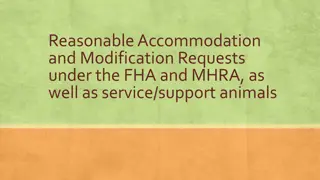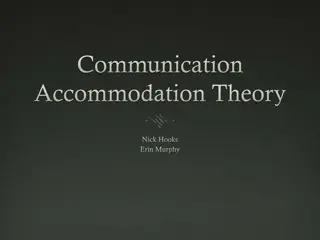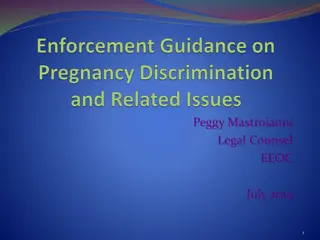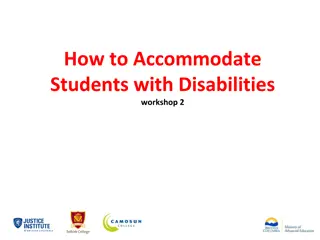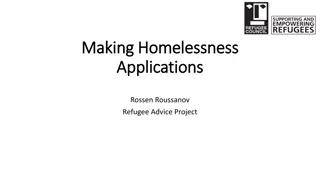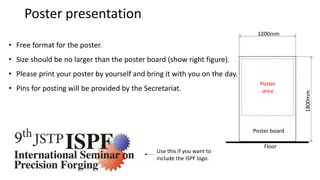Understanding ADA, ADAAA, and Reasonable Accommodation
This informational session covers the fundamentals of the Americans with Disabilities Act (ADA), Americans with Disabilities Act Amendments Act (ADAAA), and the Reasonable Accommodation process. Topics include the history of ADA and ADAAA, definition of disability, State of Maryland's accommodation policies, ADA Coordinator role, and how to request accommodations. Learn about Title I Employment provisions and how employers must provide reasonable accommodations for qualified individuals with disabilities.
Download Presentation

Please find below an Image/Link to download the presentation.
The content on the website is provided AS IS for your information and personal use only. It may not be sold, licensed, or shared on other websites without obtaining consent from the author. Download presentation by click this link. If you encounter any issues during the download, it is possible that the publisher has removed the file from their server.
E N D
Presentation Transcript
THE FUNDAMENTALS OF THE AMERICANS WITH DISABILITIES ACT (ADA), AMERICANS WITH DISABILITIES ACT AMENDMENTS ACT (ADAAA) & REASONABLE ACCOMMODATION PROCESS Presented by:
WHAT YOU WILL LEARN This informational session will provide you with fundamental knowledge of the ADA, ADAAA and Reasonable Accommodation process. The following information will be reviewed: History of ADA & ADAAA Definition of a disability defined by law State of Maryland Reasonable Accommodation Request Policy and Procedure ADA Coordinator Role How to request a Reasonable Accommodation Role/Responsibility of Management 1
HISTORY OF ADA & ADAAA This informational session will provide you with fundamental knowledge of the ADA, ADAAA and Reasonable Accommodation process. The following information will be reviewed: History of ADA & ADAAA Definition of a disability defined by law State of Maryland Reasonable Accommodation Request Policy and Procedure ADA Coordinator Role How to request a Reasonable Accommodation Role/Responsibility of Management 2
HISTORY OF ADA & ADAAA (CONT.) Title I (Employment) is designed to help individuals with disabilities access the same employment opportunities and benefits available to people without disabilities. Employers are to provide Reasonable Accommodations to qualified applicants and employees, which are modification s or adjustments to a job or the work environment that will enable an applicant or employee with a disability to participate in the application process or to perform the essential job functions. The ADA was extended to the Americans with Disabilities Act Amendments Act (ADAAA) in 2008 signed into law and effective on January 1, 2009. The ADAAA clarified the definition of disability. 3
WHAT IS A DISABILITY AS DEFINED BY THE LAW? According to the Equal Employment Opportunity Commission (EEOC) not everyone with a medical condition is protected by the law. In order to be protected, a person must be qualified for the job and have a disability as defined by the law. A person can show that they have a disability in one of three ways: A person may be disabled if he or she has a physical or mental condition that substantially limits a major life activity (such as walking, talking, seeing, hearing, or learning). A person may be disabled if he or she has a history of a disability (such as cancer that is in remission). A person may be disabled if he is believed to have a physical or mental impairment that is not transitory (lasting or expected) 4
REASONABLE ACCOMMODATION A reasonable accommodation is defined as Modification(s) or adjustment(s) to a job application process that enable a qualified applicant with a disability to be considered for the position such qualified applicant desires; or Modification(s), adjustment(s), or change to a job or work environment or to the manner or circumstances under which the position held or desired is customarily performed, that enables a qualified individual with a disability to perform the essential functions of that position; or Modification(s) or adjustment(s) that enable an employee with a disability to enjoy equal benefits and privileges of employment as are enjoyed by other similarly situated employees. Only individuals who have an actual disability, or who have a record of a disability are entitled to accommodations; individuals who are regarded as having a disability are not entitled to accommodations. 5
EXAMPLES OF REASONABLE ACCOMMODATION Making existing facilities used by employees readily accessible to and usable by persons with disabilities. Job restructuring, modifying work schedules, reassignment to a vacant position; Acquiring or modifying equipment or devices, adjusting or modifying examinations, training materials, or policies, and providing qualified readers or interpreters. A deaf applicant may need a sign language interpreter during the job interview. An employee with diabetes may need regularly scheduled breaks during the workday to eat properly and monitor blood sugar and insulin levels. A blind employee may need someone to read information posted on a bulletin board. An employee with cancer may need leave to have radiation or chemotherapy treatments. 6
ADA COORDINATOR ROLE Coordinates the interactive process with the employee and designated manager/supervisor during the reasonable accommodation process. Trains managers, supervisors and employees on the disability laws and reasonable accommodation process. Administers reasonable accommodations to all qualified employees and job applicants. Ensures that meeting/conference rooms, lunch rooms and employment test are accessible. Ensures all agency accessibility requirements are met. 7
HOW TO REQUEST A REASONABLE ACCOMMODATION It is the employee and/or job applicant s responsibility to inform management/supervisors or recruiters about their need for a Reasonable Accommodation. Employees may make a request to their supervisor or designated ADA Coordinator for a modification to their job as a result of a disability. Employees may request an accommodation at anytime during the application process or during employment. Employees may mention to their supervisor challenges they are experiencing while performing their job due to a medical condition. Job applicants may self identify during the application process that they have a disability and need for an accommodation(s). There is no formalities for an employee to request an accommodation. It is the responsibility of the employer to recognize an accommodation request. The accommodation request does not have to come directly from the employee, the request can come from a Spouse, Parent, Physician, Job Coach, and Union Rep etc. 8
EXAMPLES OF AN REQUEST A REASONABLE ACCOMMODATION An employee with sensory impairments may provide their manager with a doctors note that explains the employee impairment and recommended accommodation. An applicant who is blind and applies for a job as a customer service representative. John could perform this job with assistive technology, such as a program that reads information on the screen. During the hiring process, the applicants job coach contacted HR via phone and advised the employer of their clients disability and the accommodation needed to compete for the position. An employee or applicant can request and accommodation via phone, email, or in person conversation. 9
ROLE/RESPONSIBILITY OF MANAGEMENT Connects employees and/or job applicants with the agencies designated ADA Coordinator for assistance. Cooperates with the ADA Coordinator during the Reasonable Accommodation interactive process. Remains impartial, open-minded and confidential at all times. Do not immediately make a decision on a accommodation request Attends ADA and EEO trainings. Do not subject an employee(s) to retaliation due to their request for an accommodation. 10
STATE OF MARYLAND REASONABLE ACCOMMODATIONS POLICY AND PROCEDURE 11
REASONABLE ACCOMMODATION REQUEST FORM 12
STATE OF MARYLAND REASONABLE ACCOMMODATIONS POLICY AND PROCEDURE Connects employees and/or job applicants with the agencies designated ADA Coordinator for assistance. The State of Maryland is dedicated to full compliance with the reasonable accommodation requirements and the ADA. No employee shall be retaliated against for seeking a reasonable accommodation for a disability. This policy and procedure is in support of the Title I of the Americans with Disabilities Act (ADA) of 1990, as amended, 42 U.S.C. 12102 et seq, Section 504 of the Rehabilitation Act of 1973 as amended, Title 34 C.F.R. Section 104.12, Executive Order 01.01.2007.16 Code of Fair Employment Practices, Annotated Code of Maryland State Personnel and Pensions Article, Title 2- 302 and Title 5-2 and State Government Article, Title 20. 13
REASONABLE ACCOMMODATION INTERACTIVE PROCESS The ADA requires the employer to engage in the interactive process. Failure to do so will result in significant legal consequences. ADA Coordinator coordinates the interactive process with the employee and designated supervisor. The ADA does not indicate a specific time frame for an employer to respond and or meet an accommodation request. The law requires the employer to respond to accommodation requests expeditiously. Unduly delay in response to an request can result in significant legal consequences. A confidential ADA file is created for the employee that is separate from the personnel file in Personnel Services. The decision to grant or deny a reasonable accommodation will be provided to the employee and manager in writing. The employer is not required to provide the accommodation requested but must provide and accommodation that is reasonable and effective for both the employee and employer. 14
DENIAL OF ACCOMMODATION REQUESTS Undue Hardships are determined on a case-by-case basis. The nature and net cost of the accommodation needed under this part, taking into consideration the availability of outside funding; The overall financial resources of the facility or facilities involved in the provision of the reasonable accommodation, the number of persons employed at such facility and the effect on expenses and resources; The type of operation or operations of the employer including the composition, structure and functions of the work force of the employer, and the geographic separateness and administrative or fiscal relationship of the facility or facilities in question to the employer; The accommodation poses a direct threat to the health and safety of other employees and other persons associated to the business; and The impact of the accommodation upon the operation of the facility, including the impact on the ability of other employees to perform their duties and the impact on the facility s ability to conduct business. 15
ADA AND COVID 19 Covid-19 has changed how we operate in unpreceded ways. Despite such challenges, employers are still required to comply with ADA laws. Therefore, employers will have to modify how accommodation requests are handled and be creative in determining an effective accommodation for both the employer and the employee. 16
ADA AND COVID 19 The EEOC has provided guidance on how to handle reasonable accommodation requests related to COVID-19 The EEOC guidance are consistent with ADA laws and protections and do not interfere with CDC guidelines The process of handling reasonable accommodation request related to COVID-19 is the same as any other accommodation requests The employer must engage in the interactive process It is important to not make a sudden decision on accommodation request related to COVID-19 17
ADA AND COVID 19 Some common reasons an employee may request a reasonable accommodation related to COVID-19: General fear of contracting COVID-19 Fear of exposing a vulnerable family member to COVID-19. Having an underlying health conditions Difficulties with arranging child care General fear of potential unsafe work environment 18
ADA AND COVID 19 Not all of the reasons discussed in the previous slide are protected under the ADA. In order to determine if a COVID-19 related accommodation request is covered under the ADA, refer back the definition of reasonable accommodation. Modification(s) or adjustment(s) to a job application process that enable a qualified applicant with a disability to be considered for the position such qualified applicant desires Modification(s) or adjustment(s) that enable an employee with a disability to enjoy equal benefits and privileges of employment as are enjoyed by other similarly situated employees. 19
COMMON PITFALLS Ignoring a request- this is the same as denying a request Making assumption about accommodation that is needed Sharing the disability with other employees who do not need to know the information Not including employee in trainings or other work activities because of no accommodations 20
BEST PRACTICES Do not nit-pick whether the condition is a disability Focus on the accommodation Request medical documentation from qualified medical personnel before providing accommodation, if needed Keep an open mind during the interactive process Refer all ADA matters to the ADA Coordinator DO NOT RETALIATE! 21
QUESTIONS 22
REFERENCES Equal Employment Opportunity Commission https://www.eeoc.gov/ Department of Budget and Management http://dbm.maryland.gov/eeo/Pages/EEOHome.aspx Job Accommodation Network (JAN) https://askjan.org/ 23


